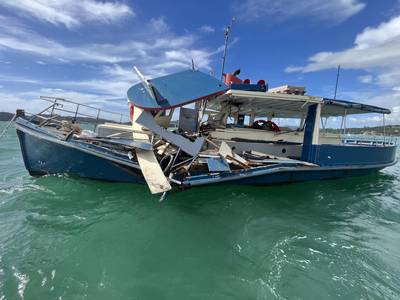Collision: Neither Skipper Kept Watch Properly
New Zealand’s Transport Accident Investigation Commission (TAIC) has released its report into the collision between the passenger ferry Waitere and the recreational vessel Onepoto in Paihia, Bay of Islands, on April 13, 2023.
The Onepoto collided with the passenger ferry Waitere, known locally as the Blue Ferry, while the ferry was on its way from Russel to Paihia.
The TAIC report describes catastrophic damage to the Waitere, which later sank. The Waitere's master was seriously injured, but its 19 passengers were largely uninjured. The Onepoto's skipper and passenger were uninjured but there was some damage to the boat.
Both vessels' navigation was unsafe, reports TAIC. Almost certainly, this was because neither skipper kept a proper watch. Both did eventually see the other vessel, but too late to take avoiding action.
The Onepoto was navigating at 20.5 knots while its skipper was distracted by an engine alarm. Had the skipper reduced speed while attending to the engine alarm, it's very likely the collision would have been avoided or its consequences diminished.
The master of the Waitere did not see the Onepoto until it was about five meter away and did not have enough time to take action to avoid the collision.
Regulations require every maritime transport operator to detail the risks and planned mitigations for each of their vessels in a Maritime Transport Operator Plan (MTOP). But the MTOP for the Waitere didn't do that; it omitted procedures for safe watchkeeping and keeping a good lookout; contained ambiguities, irrelevant and inaccurate information; and didn't identify and mitigate the risk of the sole-charge master being incapacitated.
And the regulatory system didn't detect the problems with the Waitere's MTOP.
TAIC’s lessons for all skippers:
Proper lookout: look and listen and do everything you can to determine if there's a risk of collision. In a crossing situation, regardless of which vessel is designated to give way, both must be vigilant. Both must keep track of how they're doing at avoiding the other vessel until they are clear of each other.
Sensible speed: ensure your speed gives you time to determine if you could collide and enables you to stop in a safe distance if required.














